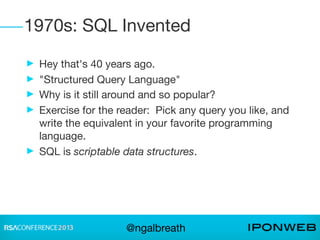SQL-RISC: New Directions in SQLi Prevention - RSA USA 2013
- 1. SQL-RISC New Directions in SQLi Prevention Nick Galbreath RSA 2013-02-27
- 2. SQL-RISC: NEW DIRECTIONS IN SQLI DETECTION AND PREVENTION Nick Galbreath IPONWEB ► Session ID: ASEC-‐W23 ► Session Classification: Advanced
- 3. Latest version of these slides: http://client9.com/20130227/ Tweet tweet: @ngalbreath Originally presented at: RSA Conference USA Moscone Center San Francisco, California February 27, 2013 10:40 AM, Room 132
- 4. What if we could substantially reduce the SQLi attack surface of a web application? @ngalbreath
- 5. without new hardware or firewalls? @ngalbreath
- 6. without application changes? @ngalbreath
- 7. and comes with free SQLi attack monitoring? @ngalbreath
- 8. Wild Speculation? @ngalbreath
- 9. A Brief History of SQL
- 10. 1970s: SQL Invented ► Hey that's 40 years ago. ► "Structured Query Language" ► Why is it still around and so popular? ► Exercise for the reader: Pick any query you like, and write the equivalent in your favorite programming language. ► SQL is scriptable data structures. @ngalbreath
- 11. 1972: Oracle Releases the First Commercial Database Also, Coppola releases The Godfather @ngalbreath
- 12. Remember the 80s? ► Networking sucked! ► TCP/IP not widespread ► Computers are fragile, expensive and slow ► Shoulder-pads so what do you do? @ngalbreath
- 13. Centralize ► Move computation as close as possible to the data ► Move to super-servers ► Have cheap/dumb clients @ngalbreath
- 14. 1988: Oracle V6 ► The Database is now a full programming environment ► Unicode/UTF8 not standard ► Complexity explosion ► ... but most clients are private Also in 1988: Crack Cocaine 'invented' @ngalbreath
- 15. And then the 1990s ► TCP/IP ► Cheap CPUs ► Web Browsers ► Attaching databases to public networks This is why most of us are here today. @ngalbreath
- 16. 2000+ Web Scale ► Discovery that data problems are a lot more painful than CPU problems. ► Turns out disk drives are mechanical ► If your database maxes out, you have big problems... so move everything out of the database. ► Complete reversal in strategy @ngalbreath
- 17. SQL isn't going anywhere ► For front-ends, general trend is federating data across cheap machines, using stripped down SQL ► SQL-like languages used by Amazon, Google and others. ► Still great for analytics and reporting on the back end, and generic data storage. ► But we stuck with legacy of the past. @ngalbreath
- 18. SQL'S DARK CORNERS ► bit.ly/UkQd7Z
- 19. SQL is Huge ► 40+ years of built up crud ► 1992 spec is 625 pages of plain text ► 2003 spec is 128 pages of BNF ► No one is completely compliant ► Every one has special extensions SQL is more complicated than you think.... @ngalbreath
- 20. SQL Integer Forms • [0-9]+ • 0x[0-9a-fA-F]+ 0xDEADbeef MySQL, MSSQL 0x is case sensitive • 0x MSSQL only • x'DEADbeef' PgSQL • b'10101010' MySQL, PgSQL • 0b010101 MySQL @ngalbreath
- 21. SQL Floating Point Forms ► digits ► digits[.] ► digits[.]digits ► digits[eE]digits ► digits[eE][+-]digits ► digits[.][eE]digits ► digits[.]digits[eE][+-]digits ► http://bit.ly/Qp6KTu ► digits[.]digits[eE]digits ► [.]digits ► [.]digits[eE]digits ► [.]digits[eE][+-]digits Optional starts with [+-] ► "binary_float_infinity" (O) Optional ending with [dDfF] (Oracle) @ngalbreath
- 22. SQL Money Literals ► MSSQL has a money type. ► -$45.12 ► $123.0 ► +$1,000,000.00 Commas ignored ► Many symbols are accepted for currency type @ngalbreath
- 23. SQL Ridiculous Operators ▶ != not equals, standard ▶ <=> mysql ▶ <> mssql ▶ ^= oracle ▶ !>, !< not less than mssql ▶ / oracle ▶ !! factorial (pgsql) ▶ |/ square root (pgsql) ▶ ||/ cube root (pgsql) ▶ ** exponential (oracle) @ngalbreath
- 24. SQL Strings, Charset & Comments Such a tangled mess, I defer to my DEFCON 20 talk: http:// client9.com/ 20120727/ @ngalbreath
- 25. SQLi Detection
- 26. Keyword Detection s/UNION.ALL/i ► The dumbest possible regexp. ► I've used this regexp as a goof for a while, but oddly works well in detecting SQLi scans. dow ► Almost zero false positives ore sha f @ngalbreath
- 27. By Using Regular Expressions Trying to catch more SQLi attacks leads to the question of is user input SQLi or not? Using regular expressions you end up with something like this: (?:)s*whens*d+s*then)|(?:"s*(?:#|--|{))|(?:/*!s?d+)|(?:ch(?:a)?rs*(s*d)|(?:(?:(n?and|x?or|not)s+||||&&)s*w+ ()(?:[s()]cases*()|(?:)s*likes*()|(?:havings*[^s]+s*[^ws])|(?:ifs?([dw]s*[=<>~])(?:"s*ors*"?d)|(?:x(?:23| 27|3d))|(?:^.?"$)|(?:(?:^["]*(?:[d"]+|[^"]+"))+s*(?:n?and|x?or|not||||&&)s*[w"[+&!@(),.-])|(?:[^ws]w+s*[|-]s*"s* w)|(?:@w+s+(and|or)s*["d]+)|(?:@[w-]+s(and|or)s*[^ws])|(?:[^ws:]s*dW+[^ws]s*".)|(?:Winformation_schema| table_nameW)(?:"s**.+(?:or|id)W*"d)|(?:^")|(?:^[ws"-]+(?<=ands)(?<=ors)(?<=xors)(?<=nands)(?<=nots)(?<=||)(?<=& &)w+()|(?:"[sd]*[^ws]+W*dW*.*["d])|(?:"s*[^ws?]+s*[^ws]+s*")|(?:"s*[^ws]+s*[Wd].*(?:#|--))|(?:".**s* d)|(?:"s*ors[^d]+[w-]+.*d)|(?:[()*<>%+-][w-]+[^ws]+"[^,])(?:d"s+"s+d)|(?:^admins*"|(/*)+"+s?(?:--|#|/*|{)?)| (?:"s*or[ws-]+s*[+<>=(),-]s*[d"])|(?:"s*[^ws]?=s*")|(?:"W*[+=]+W*")|(?:"s*[!=|][ds!=+-]+.*["(].*$)|(?:"s*[!=|][d s!=]+.*d+$)|(?:"s*likeW+[w"(])|(?:siss*0W)|(?:wheres[sw.,-]+s=)|(?:"[<>~]+")(?:unions*(?:all|distinct|[(!@]*)? s*[([]*s*select)|(?:w+s+likes+")|(?:likes*"%)|(?:"s*likeW*["d])|(?:"s*(?:n?and|x?or|not ||||&&)s+[sw]+=s*w+ s*having)|(?:"s**s*w+W+")|(?:"s*[^?ws=.,;)(]+s*[(@"]*s*w+W+w)|(?:selects*[[]()sw.,"-]+from)|(?:find_in_sets* ()(?:ins*(+s*select)|(?:(?:n?and|x?or|not ||||&&)s+[sw+]+(?:regexps*(|soundss+likes*"|[=d]+x))|("s*ds*(?:--| #))|(?:"[%&<>^=]+ds*(=|or))|(?:"W+[w+-]+s*=s*dW+")|(?:"s*iss*d.+"?w)|(?:"|?[w-]{3,}[^ws.,]+")|(?:"s*iss*[d.]+ s*W.*")(?:[dW]s+ass*["w]+s*from)|(?:^[Wd]+s*(?:union|select|create|rename|truncate|load|alter|delete|update|insert| desc))|(?:(?:select|create|rename|truncate|load|alter|delete|update|insert|desc)s+(?:(?:group_)concat|char|load_file)s?(?)| (?:ends*);)|("s+regexpW)|(?:[s(]load_files*()(?:@.+=s*(s*select)|(?:d+s*ors*d+s*[-+])|(?:/w+;?s+(?:having|and| or|select)W)|(?:ds+groups+by.+()|(?:(?:;|#|--)s*(?:drop|alter))|(?:(?:;|#|--)s*(?:update|insert)s*w{2,})|(?:[^w]SETs*@ w+)|(?:(?:n?and|x?or|not ||||&&)[s(]+w+[s)]*[!=+]+[sd]*["=()])(?:"s+ands*=W)|(?:(s*selects*w+s*()|(?:*/ from)|(?:+s*d+s*+s*@)|(?:w"s*(?:[-+=|@]+s*)+[d(])|(?:coalesces*(|@@w+s*[^ws])|(?:W!+"w)|(?:";s*(?:if|while| begin))|(?:"[sd]+=s*d)|(?:orders+bys+ifw*s*()|(?:[s(]+cased*W.+[tw]hen[s(])(?:(select|;)s+(?:benchmark|if|sleep) s*?(s*(?s*w+)(?:creates+functions+w+s+returns)|(?:;s*(?:select|create|rename|truncate|load|alter|delete|update|insert| desc)s*[[(]?w{2,})(?:alters*w+.*characters+sets+w+)|(";s*waitfors+times+")|(?:";.*:s*goto)(?:procedures+analyses* ()|(?:;s*(declare|open)s+[w-]+)|(?:creates+(procedure|function)s*w+s*(s*)s*-)|(?:declare[^w]+[@#]s*w+)|(execs* (s*@)(?:selects*pg_sleep)|(?:waitfors*delays?"+s?d)|(?:;s*shutdowns*(?:;|--|#|/*|{))(?:sexecs+xp_cmdshell)|(?:"s*! s*["w])|(?:fromW+information_schemaW)|(?:(?:(?:current_)?user|database|schema|connection_id)s*([^)]*)|(?:";?s*(?:select| union|having)s*[^s])|(?:wiifs*()|(?:execs+master.)|(?:union select @)|(?:union[w(s]*select)|(?:select.*w?user()| (?:into[s+]+(?:dump|out)files*")(?:merge.*usings*()|(executes*immediates*")|(?:W+d*s*havings*[^s-])|(?:matchs*[w(), +-]+s*againsts*()(?:,.*[)da-f"]"(?:".*"|Z|[^"]+))|(?:Wselect.+W*from)|((?:select|create|rename|truncate|load|alter|delete| update|insert|desc)s*(s*spaces*()(?:[$(?:ne|eq|lte?|gte?|n?in|mod|all|size|exists|type|slice|or)])(?:(sleep((s*)(d*) (s*))|benchmark((.*),(.*))))(?:(union(.*)select(.*)from))(?:^(-0000023456|4294967295|4294967296|2147483648|2147483647| 0000012345|-2147483648|-2147483649|0000023456|2.2250738585072007e-308|1e309)$) @ngalbreath
- 28. libinjection First presented at Black Hat USA 2012 http://client9.com/20120725 iSEC Partners party at Bellagio
- 29. libinjection ▶ Takes input and create tokens as if it SQL ▶ Compares first 5 tokens to "things that match SQLi" ▶ 50k+ SQLi samples, some from wild, some hand made, some from scans ▶ C, 100k checks per second ▶ Open Source, BSD License ▶ http://client9.com/libinjection @ngalbreath
- 30. Why do we have UNION at all? ▶ http://www.deepthoughtsbyjackhandey.com and what else do I, the developer, never use, but is commonly used by SQLi attackers? @ngalbreath
- 31. Let's use libinjection to find features of SQL used in SQLi! ► That's what I wrote in the abstract. ► Turns out to be not necessary ► Used the 50,000+ SQLi samples library from libinjection and ... ► ... the Awesome Power of Grep (well ... python regexp actually) @ngalbreath
- 32. A Highly Unscientific collection of 50,000+ SQLi attacks collected from actual attacks, scanners, how to guides, etc. But doesn't take into account: ► Frequency ► Severity ► Uniqueness hat! So W ► Actual successful attacks versus probes ► Doesn't look at exfiltration techniques @ngalbreath
- 33. SQL used in SQLi union 75% comments (any type) 70% concat, etc 23% hex number literals 22% subselects 22% chr(),char() 6% aes, hex, compress 4% SQL variables 2% @ngalbreath
- 34. 95% reduction in SQLi By eliminating the following in SQL: ➡unions ➡comments ➡subselects More than 95% of all SQLi samples were prevented. @ngalbreath
- 35. 98+% reduction in SQLi ► By eliminating the remaining 'unusual' SQL, more than 98% of SQLi samples were prevented or rejected. ► Remaining 2% of SQLi attacks are all equivalent of 1 OR 1=1 ► Those remaining SQLi probes are mostly annoying, and mostly harmless. @ngalbreath
- 36. And of the course the obvious Not represented by frequency, but all database extensions that allow shell commands, networking calls, etc. •Oracle: dbms_pipe functions (networking, shell) •Oracle: ctxsys functions (admin info) •MSSQL: xp_cmdshell (shell access) •MSSQL: opendatasource (networking) •Oracle: utl_smtp (sending email) •You probably know of others. Most vendors provide ways to disable these commands, or off by default. Will focus on pure SQL. @ngalbreath
- 37. Introducing SQL-RISC I call this simplified SQL – SQL that limits SQLi damage -- SQL-RISC in honor of RISC computing. http://en.wikipedia.org/wiki/Reduced_instruction_set_computing @ngalbreath
- 38. Feasibility: Can public applications run using SQL-RISC?
- 39. Can we replace unions? ► Strongly suspect most? many? websites do not use unions. ► All unions can be rewritten into two queries. Minor overhead cost. ► Applications can create 'views' if absolutely required. @ngalbreath
- 40. Can we remove SQL comments? ► Uhh, I have a hard time getting developers to write any comments, let alone comments in SQL. ► Or just allow /* */ only at start of query (some ORMs generate a comment on where the query is coming from) @ngalbreath
- 41. Can we replace SQL subselects? ► All subselects can be re-written as joins , with almost no application level code changes needed. ► SQLi that uses subselects can not be rewritten as joins (except in rare cases) @ngalbreath
- 42. Can we replace SQL string functions? ► Including: substring, concatenation, encoding, encrypting, char functions, replacements ► Easy to move into application logic ► Suspect many web apps don't use these. @ngalbreath
- 43. Other SQL Functions sleep/waitfor/shutdown 3.2% Having a hard time seeing any in boolean mode 1.7% need for them in public drop|create|replace 1.6% rand|random applications. 1.4% dbms_ 1.0% convert 0.9% Again, I was going to analyze updatexml|xmltype 0.9% generate_series 0.9% "real world" benign SQL, but randomblob 0.8% I've never used any of these waitfor 0.5% functions, ever, in any web extractvalue 0.5% application. begin 0.5% load_file 0.3% ascii 0.2% nvarchar 0.1% as binary 0.1% into outfile 0.01% @ngalbreath
- 44. Enterprise Apps ► If SQL-RISC were implemented as a separate client, then ► public apps could use SQL-RISC ► internal apps could use regular SQL, and use all functions if required. ► This would make adoption much easier. @ngalbreath
- 45. SQL-RISC Benefits
- 46. Fixing SQLi the Old Way ► Ensuring that every user input is properly validated is intractable (true, some frameworks help, but .... only if you are using them) ► Parameterized queries helps but some common SQL expressions cannot be expressed with parameterization (e.g. IN lists) ► Auditing is very slow ► Every code change may introduce new problem. @ngalbreath
- 47. Fixing SQLi using SQL-RISC ► Using SQL-RISC may some require some application changes, however, this is a greppable finite problem. find . -name '*.php' | xargs grep -i union ► Feasibility, conversion & testing can be done before deployment of SQL-RISC. ► Once complete, the entire application, current and future is protected. @ngalbreath
- 48. Auto-Detecting Attacks By using SQL-RISC, critical SQLi features are de-activated. SQLi Attacks turn into SQL Syntax Errors @ngalbreath
- 49. SQL Syntax Errors are Easy to Monitor ► SQL Syntax errors are annoying but harmless, and are put into logs (database and/or application) ► Trivial to monitor using existing tools (e.g. grep -i 'syntax error' *.log ) ► Now you know where input validation isn't being done ▶ You should be monitoring SQL syntax errors anyways! Major alert if you are being scanner! @ngalbreath
- 50. But won't attackers just use another part of SQL? Of course they will! This is not a 100% solution but provides a good start on security by default. Possible pathways is not unlimited. Maybe I missed something, but then it's likely to be some 'exotic' part of SQL The more exotic the SQL, the easier it is to detect. @ngalbreath
- 51. Next Steps 食品サンプル
- 52. Proof of Concept Patch ► Making a source code patch to deactivating functions and features should be a relatively simple task. ► May be possible to produce a binary patch: perl -p -i -e mysqld 's/UNION/blah/g' @ngalbreath
- 53. Access Control ► However, best done via access control. ► Different clients could enable or disable SQL functions and features depending on need. ► This is a more complicated patch! @ngalbreath
- 54. Closed-Source ► I challenge you! ► Provide controls for 'advanced' SQL features or provide a simplified parser option. @ngalbreath
- 55. Let's Eat! ► Help wanted! ► contact me nickg@client9.com ► libinjection home page: http://client9.com/libinjection http:// client9.com /20130227/ @ngalbreath




















![SQL Integer Forms
• [0-9]+
• 0x[0-9a-fA-F]+ 0xDEADbeef
MySQL, MSSQL
0x is case sensitive
• 0x MSSQL only
• x'DEADbeef' PgSQL
• b'10101010' MySQL, PgSQL
• 0b010101 MySQL
@ngalbreath](https://image.slidesharecdn.com/rsa2013-sqlrisc-130225014750-phpapp02/85/SQL-RISC-New-Directions-in-SQLi-Prevention-RSA-USA-2013-20-320.jpg)
![SQL Floating Point Forms
► digits
► digits[.]
► digits[.]digits
► digits[eE]digits
► digits[eE][+-]digits
► digits[.][eE]digits
► digits[.]digits[eE][+-]digits
► http://bit.ly/Qp6KTu
► digits[.]digits[eE]digits
► [.]digits
► [.]digits[eE]digits
► [.]digits[eE][+-]digits
Optional starts with [+-]
► "binary_float_infinity" (O) Optional ending with [dDfF]
(Oracle)
@ngalbreath](https://image.slidesharecdn.com/rsa2013-sqlrisc-130225014750-phpapp02/85/SQL-RISC-New-Directions-in-SQLi-Prevention-RSA-USA-2013-21-320.jpg)





![By Using Regular Expressions
Trying to catch more SQLi attacks leads to the question of
is user input SQLi or not? Using regular expressions you
end up with something like this:
(?:)s*whens*d+s*then)|(?:"s*(?:#|--|{))|(?:/*!s?d+)|(?:ch(?:a)?rs*(s*d)|(?:(?:(n?and|x?or|not)s+||||&&)s*w+
()(?:[s()]cases*()|(?:)s*likes*()|(?:havings*[^s]+s*[^ws])|(?:ifs?([dw]s*[=<>~])(?:"s*ors*"?d)|(?:x(?:23|
27|3d))|(?:^.?"$)|(?:(?:^["]*(?:[d"]+|[^"]+"))+s*(?:n?and|x?or|not||||&&)s*[w"[+&!@(),.-])|(?:[^ws]w+s*[|-]s*"s*
w)|(?:@w+s+(and|or)s*["d]+)|(?:@[w-]+s(and|or)s*[^ws])|(?:[^ws:]s*dW+[^ws]s*".)|(?:Winformation_schema|
table_nameW)(?:"s**.+(?:or|id)W*"d)|(?:^")|(?:^[ws"-]+(?<=ands)(?<=ors)(?<=xors)(?<=nands)(?<=nots)(?<=||)(?<=&
&)w+()|(?:"[sd]*[^ws]+W*dW*.*["d])|(?:"s*[^ws?]+s*[^ws]+s*")|(?:"s*[^ws]+s*[Wd].*(?:#|--))|(?:".**s*
d)|(?:"s*ors[^d]+[w-]+.*d)|(?:[()*<>%+-][w-]+[^ws]+"[^,])(?:d"s+"s+d)|(?:^admins*"|(/*)+"+s?(?:--|#|/*|{)?)|
(?:"s*or[ws-]+s*[+<>=(),-]s*[d"])|(?:"s*[^ws]?=s*")|(?:"W*[+=]+W*")|(?:"s*[!=|][ds!=+-]+.*["(].*$)|(?:"s*[!=|][d
s!=]+.*d+$)|(?:"s*likeW+[w"(])|(?:siss*0W)|(?:wheres[sw.,-]+s=)|(?:"[<>~]+")(?:unions*(?:all|distinct|[(!@]*)?
s*[([]*s*select)|(?:w+s+likes+")|(?:likes*"%)|(?:"s*likeW*["d])|(?:"s*(?:n?and|x?or|not ||||&&)s+[sw]+=s*w+
s*having)|(?:"s**s*w+W+")|(?:"s*[^?ws=.,;)(]+s*[(@"]*s*w+W+w)|(?:selects*[[]()sw.,"-]+from)|(?:find_in_sets*
()(?:ins*(+s*select)|(?:(?:n?and|x?or|not ||||&&)s+[sw+]+(?:regexps*(|soundss+likes*"|[=d]+x))|("s*ds*(?:--|
#))|(?:"[%&<>^=]+ds*(=|or))|(?:"W+[w+-]+s*=s*dW+")|(?:"s*iss*d.+"?w)|(?:"|?[w-]{3,}[^ws.,]+")|(?:"s*iss*[d.]+
s*W.*")(?:[dW]s+ass*["w]+s*from)|(?:^[Wd]+s*(?:union|select|create|rename|truncate|load|alter|delete|update|insert|
desc))|(?:(?:select|create|rename|truncate|load|alter|delete|update|insert|desc)s+(?:(?:group_)concat|char|load_file)s?(?)|
(?:ends*);)|("s+regexpW)|(?:[s(]load_files*()(?:@.+=s*(s*select)|(?:d+s*ors*d+s*[-+])|(?:/w+;?s+(?:having|and|
or|select)W)|(?:ds+groups+by.+()|(?:(?:;|#|--)s*(?:drop|alter))|(?:(?:;|#|--)s*(?:update|insert)s*w{2,})|(?:[^w]SETs*@
w+)|(?:(?:n?and|x?or|not ||||&&)[s(]+w+[s)]*[!=+]+[sd]*["=()])(?:"s+ands*=W)|(?:(s*selects*w+s*()|(?:*/
from)|(?:+s*d+s*+s*@)|(?:w"s*(?:[-+=|@]+s*)+[d(])|(?:coalesces*(|@@w+s*[^ws])|(?:W!+"w)|(?:";s*(?:if|while|
begin))|(?:"[sd]+=s*d)|(?:orders+bys+ifw*s*()|(?:[s(]+cased*W.+[tw]hen[s(])(?:(select|;)s+(?:benchmark|if|sleep)
s*?(s*(?s*w+)(?:creates+functions+w+s+returns)|(?:;s*(?:select|create|rename|truncate|load|alter|delete|update|insert|
desc)s*[[(]?w{2,})(?:alters*w+.*characters+sets+w+)|(";s*waitfors+times+")|(?:";.*:s*goto)(?:procedures+analyses*
()|(?:;s*(declare|open)s+[w-]+)|(?:creates+(procedure|function)s*w+s*(s*)s*-)|(?:declare[^w]+[@#]s*w+)|(execs*
(s*@)(?:selects*pg_sleep)|(?:waitfors*delays?"+s?d)|(?:;s*shutdowns*(?:;|--|#|/*|{))(?:sexecs+xp_cmdshell)|(?:"s*!
s*["w])|(?:fromW+information_schemaW)|(?:(?:(?:current_)?user|database|schema|connection_id)s*([^)]*)|(?:";?s*(?:select|
union|having)s*[^s])|(?:wiifs*()|(?:execs+master.)|(?:union select @)|(?:union[w(s]*select)|(?:select.*w?user()|
(?:into[s+]+(?:dump|out)files*")(?:merge.*usings*()|(executes*immediates*")|(?:W+d*s*havings*[^s-])|(?:matchs*[w(),
+-]+s*againsts*()(?:,.*[)da-f"]"(?:".*"|Z|[^"]+))|(?:Wselect.+W*from)|((?:select|create|rename|truncate|load|alter|delete|
update|insert|desc)s*(s*spaces*()(?:[$(?:ne|eq|lte?|gte?|n?in|mod|all|size|exists|type|slice|or)])(?:(sleep((s*)(d*)
(s*))|benchmark((.*),(.*))))(?:(union(.*)select(.*)from))(?:^(-0000023456|4294967295|4294967296|2147483648|2147483647|
0000012345|-2147483648|-2147483649|0000023456|2.2250738585072007e-308|1e309)$)
@ngalbreath](https://image.slidesharecdn.com/rsa2013-sqlrisc-130225014750-phpapp02/85/SQL-RISC-New-Directions-in-SQLi-Prevention-RSA-USA-2013-27-320.jpg)



























